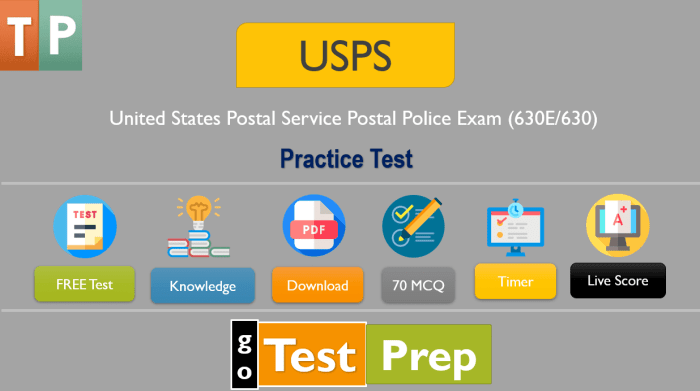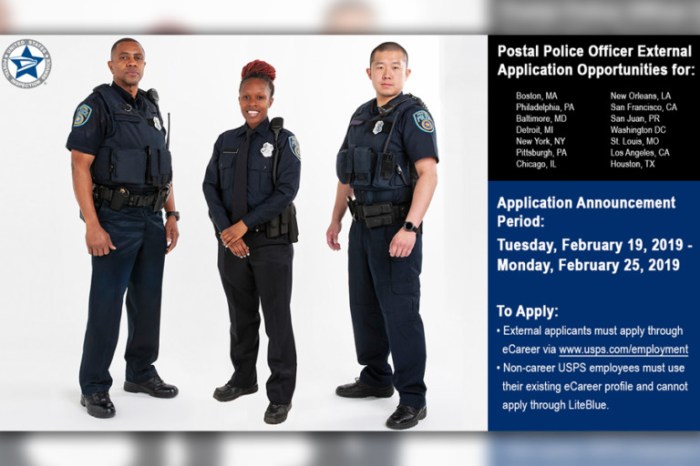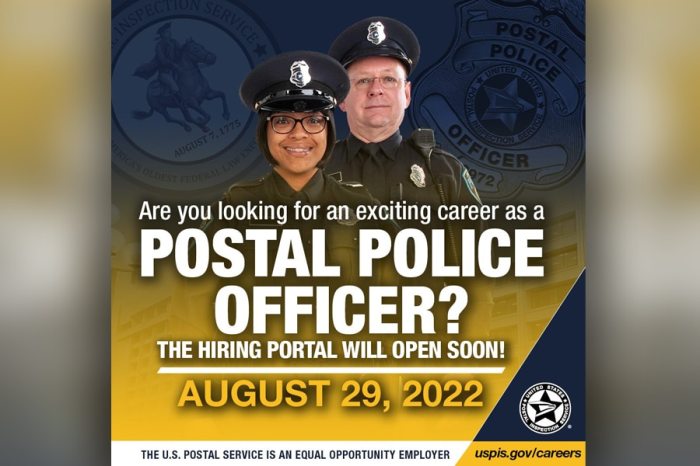Exam 630 postal police officer – Embark on a journey towards a rewarding career as a Postal Police Officer with Exam 630. This guide unveils the intricacies of the exam, equipping you with strategies, resources, and insights to excel and secure your place in this esteemed profession.
Exam 630, the gateway to becoming a Postal Police Officer, holds the key to protecting postal property and personnel. Understanding its structure, content, and preparation techniques is paramount to your success.
Job Overview

Postal Police Officers play a vital role in maintaining the safety and security of the United States Postal Service (USPS). They are responsible for protecting postal property, personnel, and mail from theft, damage, and other threats.
Postal Police Officers perform a variety of duties, including:
- Patrolling postal facilities and grounds
- Investigating crimes and apprehending suspects
- Providing security for postal employees and customers
- Escorting and transporting mail and money
- Enforcing postal laws and regulations
Qualifications and Requirements
To become a Postal Police Officer, you must meet the following qualifications and requirements:
- Be a U.S. citizen
- Be at least 21 years old
- Have a high school diploma or equivalent
- Have at least three years of experience in law enforcement or a related field
- Pass a background investigation and physical examination
Exam 630 Structure and Content

The United States Postal Police Officer Exam 630 is a comprehensive examination that evaluates candidates’ knowledge, skills, and abilities relevant to the role of a Postal Police Officer.
The exam comprises multiple-choice questions and may include essay or short-answer questions, depending on the specific agency conducting the hiring process.
Exam Format, Exam 630 postal police officer
- Multiple-choice questions typically constitute the majority of the exam and cover a range of topics related to law enforcement, postal operations, and general knowledge.
- Essay or short-answer questions may be included to assess candidates’ writing skills, analytical abilities, and understanding of specific law enforcement concepts.
Exam Content
- Law Enforcement:Questions cover topics such as criminal law, constitutional law, arrest procedures, use of force, and evidence collection.
- Postal Operations:Questions assess candidates’ knowledge of postal regulations, mail handling procedures, and security measures.
- General Knowledge:Questions cover a wide range of topics, including history, geography, current events, and basic math skills.
Exam Preparation Tips
- Study the Postal Police Officer Job Announcement:Carefully review the job announcement to understand the specific requirements and topics covered on the exam.
- Prepare for Law Enforcement Topics:Focus on studying criminal law, constitutional law, and law enforcement procedures.
- Familiarize Yourself with Postal Operations:Research postal regulations, mail handling procedures, and security measures.
- Practice Multiple-Choice Questions:Take practice tests or review sample questions to improve your ability to answer multiple-choice questions effectively.
- Develop Strong Writing Skills:Practice writing essays or short answers on law enforcement-related topics to prepare for potential essay or short-answer questions.
Study Resources and Materials

Preparing for Exam 630 requires dedication and the right resources. This section provides a comprehensive guide to help you find the most effective study materials and create a personalized study plan.
The exam 630 postal police officer requires extensive preparation. While preparing, one may also find it helpful to explore resources on port washington wi drivers ed . Returning to the topic of exam 630 postal police officer, it’s crucial to remember that practice and thorough understanding of the material are key to success.
Recommended Study Guides and Books
- Postal Exam Secrets Study Guide:Covers all exam topics with practice questions and detailed explanations.
- Kaplan Postal Police Officer Exam Review:Offers comprehensive coverage, practice tests, and strategies.
- Barron’s Postal Police Officer Exam:Includes practice tests, diagnostic tests, and review chapters.
Online Resources
- USPS Learning Center:Provides official study materials, practice tests, and tutorials.
- PostalExam.com:Offers online practice tests, study guides, and forums.
- Study.com:Provides video lessons, practice tests, and study tools.
Study Methods
Choosing the right study method is crucial. Consider your learning style and time constraints.
- Structured Study:Follow a study schedule, breaking down material into manageable chunks.
- Active Recall:Regularly test yourself to enhance memory and retention.
- Spaced Repetition:Review material at increasing intervals to strengthen memory.
Creating a Personalized Study Plan
Tailor your study plan to your individual needs:
- Assess Your Knowledge:Take practice tests to identify areas for improvement.
- Set Realistic Goals:Break down large study tasks into smaller, achievable goals.
- Prioritize Topics:Focus on the most important and challenging topics first.
- Seek Support:Consider joining study groups or connecting with a mentor.
- Stay Motivated:Set rewards for completing study sessions and track your progress.
Exam Day Tips and Strategies

Approaching the exam day with confidence and a well-thought-out strategy is crucial for success. Effective time management, stress management, and a positive mindset are essential elements to enhance your performance.
Time management is of utmost importance during the exam. Familiarize yourself with the exam structure and time allocation for each section to avoid surprises. Prioritize questions based on your strengths and weaknesses, and allocate time accordingly. Don’t get stuck on a particular question; move on and come back to it later if time permits.
Handling Stress and Anxiety
It’s natural to experience some level of stress on exam day. To mitigate this, practice relaxation techniques such as deep breathing or meditation before the exam. Visualize yourself performing well and focus on positive affirmations. Remember that you’ve prepared diligently, and trust in your abilities.
Career Advancement Opportunities

Postal Police Officers have a well-defined career path with opportunities for advancement and specialization.The ranks within the Postal Police include:
- Postal Police Officer
- Senior Postal Police Officer
- Supervisory Postal Police Officer
- Postal Police Inspector
- Postal Police Chief Inspector
Promotions are based on merit and performance, and officers can advance through the ranks by demonstrating leadership, expertise, and a commitment to the mission of the Postal Police.In addition to rank advancement, Postal Police Officers can also specialize in various areas, such as:
- Criminal investigations
- Counterterrorism
- Cybercrime
- Dignitary protection
Officers who specialize in these areas can gain additional training and experience, which can lead to leadership roles and supervisory positions.
Quick FAQs: Exam 630 Postal Police Officer
What is the eligibility criteria for Exam 630?
To be eligible for Exam 630, candidates must be U.S. citizens or permanent residents, between the ages of 18 and 37, and meet physical and medical requirements.
What types of questions are on Exam 630?
Exam 630 covers a range of topics, including law enforcement, postal regulations, and situational judgment. Questions may be multiple-choice, true/false, or essay-based.
How can I prepare for Exam 630 effectively?
Effective preparation involves studying official study materials, practicing with mock exams, and seeking guidance from experienced Postal Police Officers or mentors.